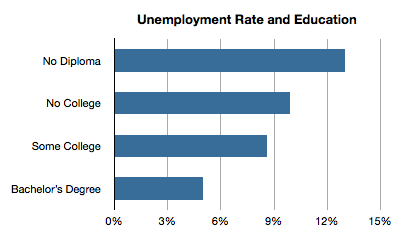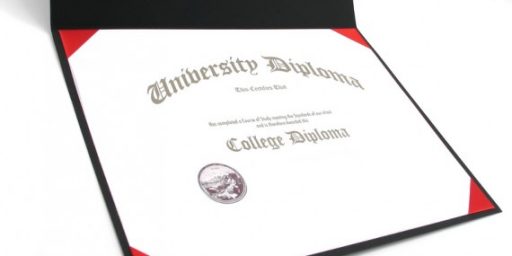Unemployment and Education
Unemployment is not equally distributed in America.
As Doug noted this morning, the recession isn’t hurting everyone equally, with almost all the pain felt in the private sector. Additionally, as Matt Yglesias and Ezra Klein have noted, the unemployment rate is quite skewed on educational attainment, too:
There’s some overlap in these trends, of course, in that government jobs disproportionately require at least some college. But it’s just a graphic illustration of the degree we’re shifting to a knowledge economy. There just aren’t that many jobs being created for high school drop-outs these days.
Matt observes:
Virtually every single member of congress, every senator, every Capitol Hill staffer, every White House advisor, every Fed governor, and every major political reporter is a college graduate. What’s more, we have a large amount of social segregation in the United States—college graduates tend to socialize with each other. And among college graduates, there simply isn’t an economic crisis in the United States.
While that’s true as a matter of personal experience — the well educated are less likely to know a lot of unemployed people than the poorly educated — it’s not as if we don’t read the papers.







Or, high school graduates for that matter, who don’t fare much better according to the chart above
And, as I pointed out in my series of posts last week, educational attainment is skewed by age cohort.
Well, one of the big reasons for the recession is the drop off in new home construction. Construction is one of the few jobs where you don’t even need a high school diploma to get a job. This shouldn’t surprise anyone, in my opinion.
<I>There just aren’t that many jobs being created for high school drop-outs these days.</I>
Which clearly tells us that we need to keep illegals in the country working at their jobs, that we need to create guest worker programs to bring more foreigners in legally, or something. Look, as much as advocates for illegals and foreigners would like it to be the case, we’re not working with a worker replacement program, what we’re actually fostering is a worker displacement program. If we’re not creating enough jobs for domestically produced high school drop-outs, then why are we importing millions of foreign high school drop-outs?
(retry after post fail)
I disagree with Tango that it’s race, but obviously we do have a choice in immigration. We can choose PhDs, if we want.
You may recall that a year or two ago the US changed policy and stopped granting automatic (or near-automatic) work visas to foreign graduates of our universities. Bill Gates and Microsoft protested the absurdity of it. We create that human capital, and then push it back to compete with us.
I don’t think we needed that graph-I think it is pretty intuitive that the more educated a person is the less likely they are to experience unemployment, or at least when they do experience unemployment their length of unemployment is probably going to be shorter since they have a credential and skill set that is likely going to be more marketable than the high school graduate that lost his job when the factory shut down.